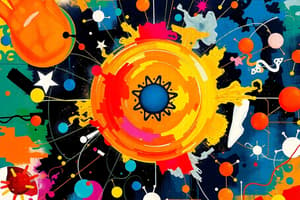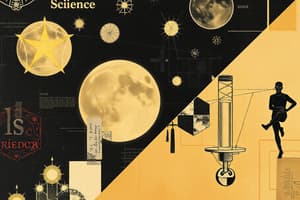Podcast
Questions and Answers
What is a hypothesis?
What is a hypothesis?
- A testable statement predicting the outcome of a study. (correct)
- An abstract concept used in mathematics.
- An unchangeable scientific law.
- A proven fact in science.
What characterizes scientific knowledge as empirical?
What characterizes scientific knowledge as empirical?
- It is obtained through observation and experimentation. (correct)
- It must be based on theories.
- It only relies on calculations.
- It assumes outcomes without testing.
Which of the following is a component of the scientific method?
Which of the following is a component of the scientific method?
- Making assumptions without data.
- Drawing conclusions without experimentation.
- Researching existing knowledge. (correct)
- Anecdotal evidence collection.
What is the primary focus of natural sciences?
What is the primary focus of natural sciences?
Which characteristic must a scientific hypothesis possess?
Which characteristic must a scientific hypothesis possess?
Which trend in science emphasizes public involvement in research?
Which trend in science emphasizes public involvement in research?
What does the term 'sustainability science' refer to?
What does the term 'sustainability science' refer to?
What is the role of a theory in science?
What is the role of a theory in science?
Flashcards are hidden until you start studying
Study Notes
Definition of Science
- Systematic study of the natural world.
- Involves observation, experimentation, and analysis.
Key Concepts in Science
- Hypothesis: A testable statement predicting the outcome of a study.
- Theory: A well-substantiated explanation of an aspect of the natural world.
- Law: A statement based on repeated experimental observations that describes some aspect of the universe.
Scientific Method
- Observation: Gathering information and noting phenomena.
- Question: Formulating a question based on observations.
- Research: Conducting background research to understand existing knowledge.
- Hypothesis Formation: Creating a hypothesis to be tested.
- Experimentation: Designing and conducting experiments to test the hypothesis.
- Analysis: Analyzing data and results from experiments.
- Conclusion: Drawing conclusions based on the analysis and revising hypotheses if necessary.
- Reporting: Sharing results with the scientific community for validation.
Branches of Science
- Natural Sciences: Study of natural phenomena (e.g., Physics, Chemistry, Biology).
- Formal Sciences: Study of abstract concepts (e.g., Mathematics, Logic).
- Social Sciences: Study of human behavior and societies (e.g., Psychology, Sociology).
- Applied Sciences: Practical application of scientific knowledge (e.g., Engineering, Medicine).
Importance of Science
- Helps understand the universe and the laws governing it.
- Drives technological advancement and innovation.
- Informs policy and decision-making related to health, environment, and safety.
Characteristics of Scientific Knowledge
- Empirical: Based on observation and experimentation.
- Testable: Must be able to be tested and validated.
- Repeatable: Experiments should yield consistent results when repeated.
- Falsifiable: Hypotheses must be able to be proven wrong.
Current Trends in Science
- Interdisciplinary Research: Combining different scientific fields to address complex problems.
- Citizen Science: Involvement of the public in scientific research.
- Data Science: Utilizing big data for analysis and discovery.
- Sustainability Science: Focus on environmental and sustainable development issues.
Definition of Science
- Systematic exploration of the natural world, utilizing observation, experimentation, and analysis.
Key Concepts in Science
- Hypothesis: A predictive statement that can be tested through research.
- Theory: A thoroughly validated explanation that encompasses various observations in nature.
- Law: A descriptive statement based on repeated experimental outcomes, explaining a universal phenomenon.
Scientific Method
- Observation: Collecting data and identifying significant phenomena.
- Question: Developing inquiries based on initial observations to guide research.
- Research: Reviewing existing literature to gather background knowledge pertinent to the inquiry.
- Hypothesis Formation: Crafting a testable hypothesis aimed at providing answers to the research question.
- Experimentation: Designing experiments to rigorously evaluate the hypothesis.
- Analysis: Interpreting experimental data to determine results and trends.
- Conclusion: Deriving insights from the analysis and making adjustments to the hypothesis if necessary.
- Reporting: Disseminating findings to the scientific community for scrutiny and validation.
Branches of Science
- Natural Sciences: Investigate phenomena in nature, including disciplines like Physics, Chemistry, and Biology.
- Formal Sciences: Focus on abstract concepts, encompassing fields like Mathematics and Logic.
- Social Sciences: Examine human behavior and societal interactions, including Psychology and Sociology.
- Applied Sciences: Emphasize the practical application of scientific insights in areas such as Engineering and Medicine.
Importance of Science
- Enhances understanding of the universe and the governing natural laws.
- Fuels innovation and technological progress across various sectors.
- Guides policy and decision-making in public health, environmental issues, and safety regulations.
Characteristics of Scientific Knowledge
- Empirical: Grounded in observational evidence and experimental data.
- Testable: Capable of being experimentally verified or disproven.
- Repeatable: Results should consistently reappear when experiments are replicated.
- Falsifiable: Hypotheses must allow for the possibility of being proven incorrect.
Current Trends in Science
- Interdisciplinary Research: Merging different scientific domains to tackle complex societal and environmental challenges.
- Citizen Science: Engaging the public in scientific research efforts and data collection.
- Data Science: Leveraging large datasets to facilitate insights and groundbreaking discoveries.
- Sustainability Science: Prioritizing studies that address environmental sustainability and development concerns.
Studying That Suits You
Use AI to generate personalized quizzes and flashcards to suit your learning preferences.




